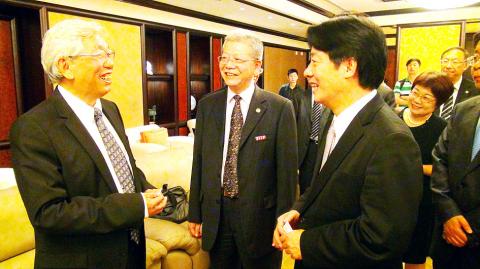Greater Tainan Mayor William Lai (賴清德) yesterday caused jitters among an audience of Chinese politicians and academics with talk about Taiwanese independence and the politically sensitive Tiananmen Square student movement on the second day of his trip to China.
Lai, a member of the Democratic Progressive Party (DPP), made his remarks at a Fudan University discussion session in Shanghai.
Regarding cross-strait exchanges, Lai said that since the Taiwanese consciousness of independence preceded the establishment of the DPP, getting rid of the “Taiwan independence clause” in its party charter would not make the society’s call for independence disappear.

Photo: CNA
According to Greater Tainan Department of Information and International Relations Director and delegation member Chao Ching-hui (趙卿惠), Lai spoke in response to a Chinese professor’s comment on what the professor described as the stalled cross-strait relationship.
Fudan University professor Jiang Yihua (姜義華) reportedly blamed the DPP’s independence platform for the alleged stall, saying that despite cross-strait exchanges over the past years, this particular problem has been little recognized and should now be faced squarely.
Lai said that the DPP’s Taiwan independence clause and its Resolution on Taiwan’s Future are part of the trajectory of the development of Taiwan’s history.
“Taiwanese independence is a cause held by the DPP, which completely respects Taiwanese people’s self-determination in terms of procedure. It has enjoyed a clear consensus in Taiwan, as [former president] Chen Shui-bian (陳水扁) was elected as president on the party’s platform,” Lai said.
“It is important to understand whether the DPP made the cause of independence arise in society, or whether it was society’s call for independence that brought the DPP into existence. Removing the DPP’s Taiwanese independence party platform would not do away with Taiwan’s call for independence,” he said.
Lai said that no problem could be solved before China understands this historical trajectory and he called on the two sides to seek common ground, but also treasure their differences through understanding and reconciliation.
The mayor also mentioned the 1989 Tiananmen Square student movement.
“Fudan University students answered to the cause of the student movement that took place after the death of [reformist Chinese Communist Party] secretary-general Hu Yaobang (胡耀邦) in 1989. And there were more than 400 professors who signed the petition urging the government to recognize the student movement as a patriotic movement,” he said.
The issue of whether Beijing would change its no-contact policy toward the DPP has again come to the forefront amid Lai’s first visit to China on Friday.
Separately yesterday, Beijing reiterated its opposition to Taiwanese independence, but said that it welcomes exchanges with people from all quarters of Taiwan — provided they support advancing cross-strait ties.
The Chinese government maintains a “clear and consistent” policy toward the DPP and stands firmly against Taiwanese independence, China’s Taiwan Affairs Office spokesperson Fan Liqing (范麗青) said when asked about whether Beijing has begun to engage with the DPP.
“We welcome anyone as long as he or she favors, supports and participates in the peaceful development of cross-strait relations, no matter what he or she has advocated in the past,” she said.
Additional reporting by CNA

SECURITY: As China is ‘reshaping’ Hong Kong’s population, Taiwan must raise the eligibility threshold for applications from Hong Kongers, Chiu Chui-cheng said When Hong Kong and Macau citizens apply for residency in Taiwan, it would be under a new category that includes a “national security observation period,” Mainland Affairs Council (MAC) Minister Chiu Chui-cheng (邱垂正) said yesterday. President William Lai (賴清德) on March 13 announced 17 strategies to counter China’s aggression toward Taiwan, including incorporating national security considerations into the review process for residency applications from Hong Kong and Macau citizens. The situation in Hong Kong is constantly changing, Chiu said to media yesterday on the sidelines of the Taipei Technology Run hosted by the Taipei Neihu Technology Park Development Association. With

CARROT AND STICK: While unrelenting in its military threats, China attracted nearly 40,000 Taiwanese to over 400 business events last year Nearly 40,000 Taiwanese last year joined industry events in China, such as conferences and trade fairs, supported by the Chinese government, a study showed yesterday, as Beijing ramps up a charm offensive toward Taipei alongside military pressure. China has long taken a carrot-and-stick approach to Taiwan, threatening it with the prospect of military action while reaching out to those it believes are amenable to Beijing’s point of view. Taiwanese security officials are wary of what they see as Beijing’s influence campaigns to sway public opinion after Taipei and Beijing gradually resumed travel links halted by the COVID-19 pandemic, but the scale of

TRADE: A mandatory declaration of origin for manufactured goods bound for the US is to take effect on May 7 to block China from exploiting Taiwan’s trade channels All products manufactured in Taiwan and exported to the US must include a signed declaration of origin starting on May 7, the Bureau of Foreign Trade announced yesterday. US President Donald Trump on April 2 imposed a 32 percent tariff on imports from Taiwan, but one week later announced a 90-day pause on its implementation. However, a universal 10 percent tariff was immediately applied to most imports from around the world. On April 12, the Trump administration further exempted computers, smartphones and semiconductors from the new tariffs. In response, President William Lai’s (賴清德) administration has introduced a series of countermeasures to support affected

Pope Francis is be laid to rest on Saturday after lying in state for three days in St Peter’s Basilica, where the faithful are expected to flock to pay their respects to history’s first Latin American pontiff. The cardinals met yesterday in the Vatican’s synod hall to chart the next steps before a conclave begins to choose Francis’ successor, as condolences poured in from around the world. According to current norms, the conclave must begin between May 5 and 10. The cardinals set the funeral for Saturday at 10am in St Peter’s Square, to be celebrated by the dean of the College